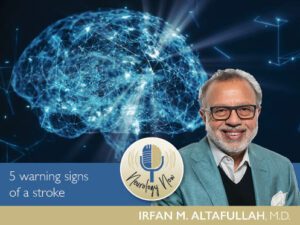The Silent Killer: Stroke Prevention and Treatment With Dr. Irfan Altafullah
Summary:
In this episode of Neurology Now, Dr. Irfan M. Altafullah joins host Pete Waggoner to cover a range of topics related to stroke, from its types and causes to symptoms, diagnosis, and treatment options.
Dr. Irfan uses relatable analogies, such as plumbing and traffic, to explain the severity and location of stroke damage. He also highlights the progress made in stroke care and how technology has greatly improved treatment and outcomes.
Listeners will gain valuable insights into stroke care and the importance of being knowledgeable about symptoms and risk factors, and making necessary lifestyle changes to reduce the risk of stroke.
Takeaways:
- Stroke patients are survivors, not victims.
- Quick action is crucial in treating stroke. The sooner medical attention is received, the better the chances of minimizing damage and improving outcomes.
In this episode:
[1:55] Host Pete Waggoner opens the discussion by asking Dr. Irfan what a stroke is. Dr. Irfan explains the two types of stroke using the plumbing analogy.
[3:35] Dr. Irfan uses an analogy–the traffic on a full-length freeway–in talking about the different levels of stroke. He explains how the size and the location of the damage are the two factors that determine the severity of the stroke and the resulting symptoms.
[9:22] Pete asks Dr. Irfan when to draw the line between being paranoid versus listening to one’s body. Dr. Irfan talks about mini-strokes, also known as the transient ischaemic attack (TIA) which are often ignored or disregarded as a passing symptom.
[16:52] Dr. Irfan gets into the diagnosis process for patients who may be suffering from a stroke. He puts emphasis on the importance of imaging in helping healthcare providers accurately determine the source and type of a stroke.
[22:18] Dr. Irfan and Pete talk about the advancements in the field and how they have been significant in improving stroke treatment and outcomes. Dr. Irfan reminisces about his 40-year journey and how it has been a privilege for him to see the transition in stroke care from the early days of limited treatment options to the current state-of-the-art techniques and therapies available today.

Resources:
- Minneapolis Clinic of Neurology
- Irfan M. Altafullah, M.D.
- North Memorial Health Hospital
- Minnesota Department of Health
- Read Show Transcript
Quotes:
“In the stroke world we don’t like using the word ‘victim’, we call people stroke survivors because we don’t want the victimization mentality. A survivor tends to fight back and do what they can to advocate for themselves and for others.” – Dr. Irfan Altafullah








